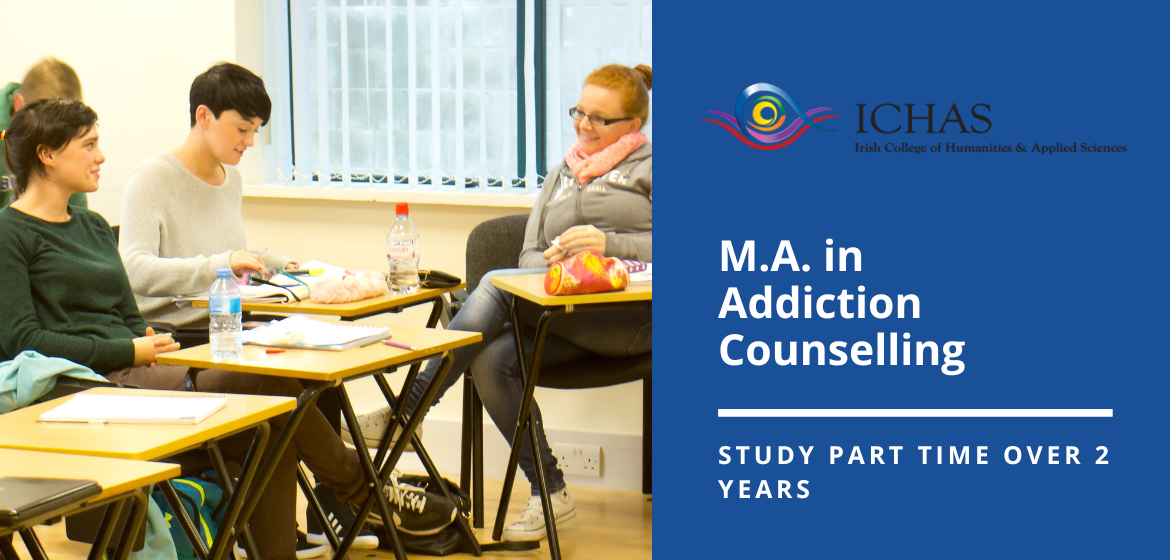
M.A. in Addiction Counselling
This Master’s programme in Addiction Counselling is designed for graduates in health and human sciences disciplines such as nursing, social care, social work, psychology and programmes in a cognate area who wish to prepare for initial access to professional Accreditation as an Addiction Counsellor.
This programme will provide a postgraduate qualification in Addiction Counselling for professionals who work with individuals, families and communities exposed to or experiencing addiction and its consequences in a range of health or social care environments. It will enable learners to specialise, lead and work for better outcomes for individuals with complex needs.
This MA in Addiction Counselling will enable graduates to specialise in counselling interventions and promote principles of respect and empowerment for clients.
In the following video, Prof. Denis Ryan goes through the key elements of the programme.
-
Award Title: Master of Arts in Addiction Counselling
-
Duration: Part Time over 2 Years
-
Tuition Fees: €8,200
-
Start Date: Sept 2025
The M.A in Addiction Counselling is designed for practitioners who hold a Level 8 degree in health or human science areas and who wish to specialise in Addiction Counselling. It is attractive to professionals who, for example, work with diverse and marginalised groups of people with addiction difficulties or are experiencing social exclusion because of the consequences of addiction. The primary focus of this programme is for working with individuals and groups but also at community and policy levels as leaders in their field.
This programme is designed for those who wish to access evidence-based interventions and create opportunities for high-quality treatment experiences for all who need them. Modules within the course are designed to build personal capacity, collaborative problem-solving skills, and an understanding of the systems and context within which clients and their families may be best supported.
This programme will provide students with both theoretical and practical opportunities for working in addiction counselling within a variety of contexts in the statutory, community and voluntary sector. The programme has been designed to facilitate students who wish to become professionally accredited by Addiction Counsellors Ireland to meet their pre-accreditation criteria.
The opportunities embedded within the programme for the development and demonstration of critical thinking skills and theoretical knowledge transfer should mean that graduates of the MA in Addiction Counselling will be prepared to lead, plan, educate, consult, manage, design, evaluate and advocate effectively in the contexts in which they are working.
All of the taught modules are designed to support learners to apply all these elements of learning during the 120 hours of client work which is required within the Professional Practice module as well as in the completion of a dissertation. The programme combines both theory and practical skills in a way that supports the academic and professional development of the learner.
Individual modules may also be taken on a standalone basis. Taught Modules are taken across two academic years where the modules are taught through a blended learning approach using a combination of classroom-based modules and Virtual Classrooms as well as work-based learning. Blended learning combines face-to-face and web-based teaching and learning, which allows students to access classes in person or using online facilities to allow for a better work/life/study balance. In certain modules, mandatory attendance is a requirement.
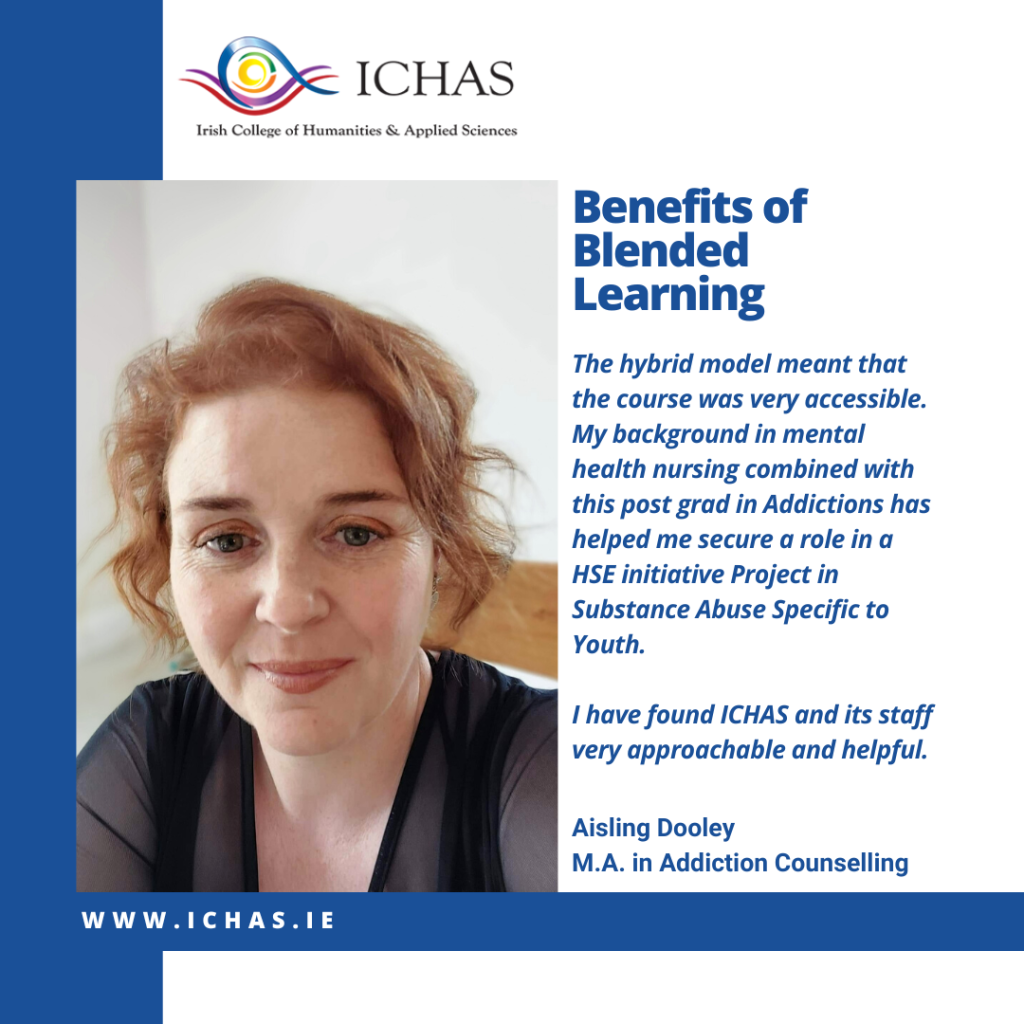
How can I complete this Course?
The Programme can be completed on a Part-time basis over two years (6 semesters) and is delivered using a blended learning approach, with both traditional face-to-face contact and synchronous delivery through the VIRI classroom (Zoom).
Lectures will normally be timetabled on one evening per week from 6pm-9pm and on approximately eight Saturdays, 9:30am-4:30pm per academic semester.
As mentioned the programme has been scheduled to facilitate blended learning. Classes will be delivered through synchronous delivery which will involve classroom-based sessions, which will also be available on-line synchronously through a VIRI classroom, allowing students to log on to live classes.
Bearing in mind the benefits to students of collaborative and peer learning, and the importance of intellectual discourse and peer support, face-to-face classroom-based learning will also occur alongside the synchronous on-line delivery. The more practical elements of the programme will require students to attend in person.
Learners engage in work-based learning and will be required to undertake 120 hours of a Professional Placement as part of the programme.
Structure of Course:
The Programme is divided into 9 modules each of which has Educational Credits (ECTS) associated with them (please see a list of the individual module titles and the associated credits below).
The course covers a range of subjects that are structured to develop competent professional practitioners. The subjects covered are designed to be both practical and theoretical as per the table below:
| Module Name | Credits |
| Understanding Addiction | 5 ECTS |
| Skills & Competencies in Addiction Counselling | 5 ECTS |
| Contemporary Evidence Based Interventions in Addiction Recovery | 10 ECTS |
| Research Methodologies & Design | 10 ECTS |
| Community Reinforcement Approach & Family aspects in Addiction | 10 ECTS |
| Comorbidity & Trauma Informed Care | 5 ECTS |
| Knowing Self | 5 ECTS |
| Professional Practice | 10 ECTS |
| Dissertation | 30 ECTS |
| Total Credits | 90 ECTS |
The programme has been designed to enable learners to demonstrate their academic and reflective learning in appropriate ways. Each module requires completion of an assessment type which will normally consist of 1 or 2 components. The assessment strategy accommodates different learning styles and therefore the programme assesses learners using a range of practical assignments, including; essays, learning journals, examinations, reflective exercises, and projects.
The completion of a research-based dissertation is a central part of the Masters programme and each student is supported by an academic supervisor for the entire period of their dissertation.
It is also important to note that learners who complete 60 ECTS and who wish to exit the programme without completing their Dissertation may be awarded a Postgraduate Diploma in Addiction Counselling
What supports are available to learners?
At ICHAS, every lecturer and member of staff is committed to excellence in education and professional practice.
- Each Module has a Module Leader who works with students to enhance their learning and will provide formative and summative feedback throughout their studies.
- Each programme has a Programme Co-ordinator and in addition, you will have direct access to the Module Leader and the Director of Graduate Studies.
- The Dissertation and Practicum are central elements of the Masters programme. Each student will undertake these modules under the direction of an Academic and Practicum supervisor respectively for these modules who will be appointed by the College.
Who Awards My Qualification?
On successful completion of the programme, your qualification is awarded by Quality and Qualifications Ireland (QQI). QQI is one of the principal Irish awarding bodies for 3rd level education in Ireland and sets the standards for awards on the NFQ. Because this programme is both validated and awarded by QQI, the Award you receive is recognised in Ireland and internationally. See www.qqi.ie for further information.
Where Can I progress to on completion of the course?
On successful completion of the MA in Addiction Counselling, students will be qualified to access Level 10 Programmes on the National Framework of Qualifications (NFQ).
What are the entry requirements for this course?
- The knowledge, skills and competence required to successfully participate in and complete this Level 9 Programme will normally require applicants to have successfully achieved a Level 2:2 award in a relevant Human Science Level 8 degree.
- Those who have completed other relevant education programmes or have relevant professional experience etc., where Recognised Prior Learning (RPL) and Acquired Prior Learning (APL) can be applied to the programme by submission of programme content, qualification and assignments equivalent to an appropriate Level 8 award at an Honours 2:2 standard can also be considered. If you wish to apply for this programme, please click on the ‘Apply Now” tab. All applicants undertake a selection interview to support applicants to make an informed decision regarding their choice of programme and to ensure suitability.
- The minimum English language proficiency requirement for this programme is B2+ in the Common European Framework of Reference for Languages which is equivalent to an IELTS score of 6.5.
- Garda Vetting is a requirement for all successful applicants.
- All applicants will be required to attend for interview to ascertain their suitability for the Programme.
Completion of the programme will facilitate graduates to meet professional accreditation requirements for professional practice in Addiction Counselling.
The MA in Addiction Counselling has many distinctive features that make it one of the leading programmes of this type.
For Example;
- It meets the QQI Award Standards for Counselling and Psychotherapy in Ireland.
- Student may seek Professional Accreditation with Addiction Counsellors Ireland
- This programme is part of a suite of programmes that have been validated by Quality and Qualifications Ireland (QQI), ensuring the quality of its teaching and assessment strategies, programme content and quality.
- It is delivered by lecturers who are experts in the fields of study.
- Recognised nationally and internationally. On completion, you will receive the Europass Diploma Supplement in addition to your degree parchment.
- It is recognised by professionally accreditation bodies within the Psychological Therapies Forum.
- It adopts a Flexible structure, meaning that students may study at a pace and duration that fits in with their lifestyle demands – students may study on a modular basis or spread the period of their studies over a timeframe that is agreed with the College.
- It focusses on interventions that have a proven evidence base in terms of effectiveness.
- It combines a well- balanced match of theory and practice.
- This course facilitates a progression route to PHD and professional doctorate level programmes.
- It facilitates access to higher-level education thus increasing employment opportunities for graduates in a range of different areas where addiction is problematic.
- It utilises blended learning approaches offering a flexible approach for all students through face to face and on-line learning.
This progrmme is offered on a part-time basis only and there are options around the payment of tuition fees with payment plans available to learners.
A central component of the ICHAS vision is the provision of flexible and affordable education for all.
The tuition fees for the programme are €8,200 (this includes a 2% PEL levy). In addition, students who opt for monthly instalments will incur an extra fee of €150 to avail of this facility. All fees are fully protected under our Protection of Enrolled Learners’ Policy.
Protection of Enrolled Learners’ Policy. All QQI accredited programmes of education and training of 3 months or longer duration are covered by arrangements under section 65 (4) of the Qualifications and Quality Assurance (Education and Training) Act 2012 whereby, in the event of the provider ceasing to provide the programme for any reason, enrolled learners may transfer to a similar programme at another provider, or, in the event that this is not practicable, the fees most recently paid will be refunded.
Additional Requirements and Costs
Please be aware that Personal Therapy and Clinical Supervision have to be completed as part of the programme and the costs associated with these are extra and not included in tuition fees.
Click to apply for this programme
Available at our Dublin and Limerick CampusesFeatured Courses
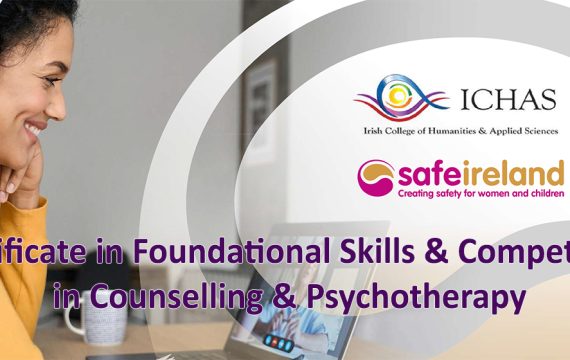
Safe Ireland-Certificate in Foundational Skills & Competence in Counselling & Psychotherapy
The Programme is designed for learners who wish to learn fundamental skills and competencies in counselling & psychotherapy practice.
FIND OUT MORE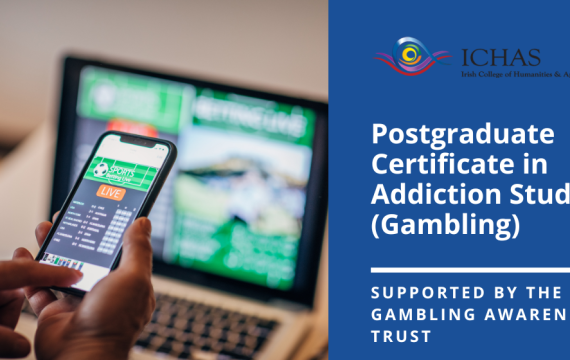
Postgraduate Certificate in Addiction Studies (Gambling)
The programme specifically aims to increase practitioner awareness and enhance relevant skills and competencies to engage with those with Gambling Addiction and to support them in their journey towards recovery
FIND OUT MORE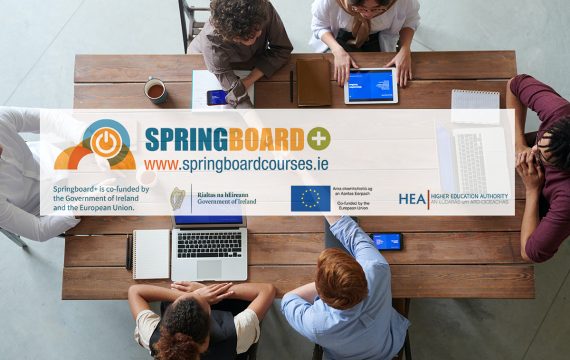
Certificate in Work-Related Behaviour
In the contemporary professional landscape, understanding the psychological underpinnings of individuals and teams is not just an asset but a necessity for fostering a healthy, productive, and fulfilling work environment
FIND OUT MORE

























